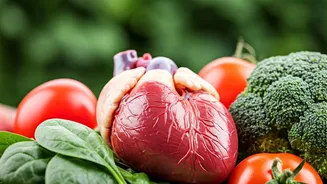Importance of Diet
The cornerstone of heart health lies in the foods we consume. Making informed choices about your diet is a powerful step towards maintaining a robust cardiovascular
system. This involves a keen awareness of what you eat regularly. Recognizing that certain foods contribute to the buildup of blockages within the heart's blood vessels makes dietary modifications imperative. Understanding the impact of the food you eat can prevent various heart problems. Including specific items in your daily diet can help repair blood vessels. Regular inclusion of these foods can lead to enhanced blood flow, better oxygen supply, and a reduced risk of cardiovascular diseases, contributing to overall health and vitality.
Garlic's Powerful Benefits
Garlic, a staple in Indian kitchens, is much more than a flavour enhancer; it's a heart-healthy powerhouse. Garlic contains allicin, a compound known to lower cholesterol levels and prevent blood clots. By incorporating garlic into your cooking, you’re actively reducing the risk of heart blockages. The pungent bulb also helps in relaxing blood vessels, which improves blood flow. When consumed regularly, garlic supports the cardiovascular system and contributes to overall heart wellness. You can use it in various Indian dishes, like curries, dals, and chutneys. Besides its cardiovascular benefits, garlic also provides antioxidant properties. Including garlic in your daily diet supports heart health and provides additional health benefits.
Turmeric's Anti-Inflammatory Action
Turmeric, a vibrant yellow spice, is a cornerstone of Indian cuisine and traditional medicine. It contains curcumin, a compound known for its potent anti-inflammatory properties. This is a critical factor in maintaining heart health. Inflammation can damage blood vessels, leading to blockages and heart disease. Curcumin helps in reducing inflammation, preventing damage to the heart and blood vessels. Additionally, turmeric acts as an antioxidant, combating free radicals that can harm heart tissues. Including turmeric in your diet, perhaps in your morning milk, your curries, or even in a cup of herbal tea, can significantly contribute to better heart health and overall well-being. Regular consumption ensures your heart remains protected from inflammatory damage.
Adding Healthy Oils
Healthy fats are essential for a healthy heart, and the right oils can make a big difference. Olive oil and mustard oil are excellent choices for heart health. These oils are rich in monounsaturated fats, which help reduce bad cholesterol levels (LDL) while boosting good cholesterol (HDL). Olive oil is a core ingredient in many dishes in India. Mustard oil, popular in many Indian regions, is also beneficial due to its high omega-3 fatty acid content. Omega-3s further reduce inflammation and support the cardiovascular system. When cooking, swap saturated fats like butter or ghee with these heart-healthy alternatives. By doing this, you're not just improving flavour; you are actively contributing to heart health and reducing the risk of blockages and damage to blood vessels. Choosing the right oils is a simple but impactful way to improve your heart health.
Embracing Nuts and Seeds
Nuts and seeds are nutritional powerhouses and wonderful additions to a heart-healthy diet. Almonds, walnuts, flaxseeds, and chia seeds are rich in omega-3 fatty acids, fiber, and various antioxidants. These nutrients are essential for a healthy heart. Walnuts and almonds are known to lower LDL cholesterol, and improve blood vessel function. Flaxseeds and chia seeds provide soluble fiber, which helps in binding cholesterol and removing it from the body. You can add a handful of nuts and seeds to your breakfast cereals, salads, or have them as snacks. Consuming these regularly provides essential nutrients and offers a simple way to protect your heart health. They offer a versatile way to incorporate heart-healthy components into your regular diet, enhancing your overall well-being.
Leafy Greens for Defence
Leafy greens are an essential part of heart-healthy eating habits and a staple in Indian cuisine. Spinach, kale, and fenugreek leaves are high in vitamins, minerals, and antioxidants, which play a crucial role in maintaining cardiovascular health. Leafy greens are packed with vitamins that help protect the blood vessels. Antioxidants combat harmful free radicals, that can damage the heart and arteries. Incorporating leafy greens into your diet helps lower cholesterol levels, reduces blood pressure, and decreases the risk of heart disease. You can include them in your diet through a variety of dishes. Whether you enjoy them in a salad, a sautéed vegetable side dish, or added to your favourite curry, leafy greens provide excellent support for heart health and enhance overall well-being.
















